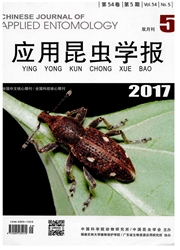

 中文摘要:
中文摘要:
拟步甲科昆虫光滑鳖甲(Anatolica polita Kaszab)和小胸鳖甲(Microdera punctipennis Kaszab)分别是新疆准噶尔盆地荒漠地区的广布种和特有种。它们的生活习性有很大差异,光滑鳖甲白天活动,且活动范围广,而小胸鳖甲喜阴避光夜晚活动,活动范围小,但在两者体内都发现有多拷贝的抗冻蛋白基因,并且抗冻蛋白基因在夏季也有表达。为了比较这两种昆虫的抗冻蛋白序列以及不同时期表达的抗冻蛋白序列的差异情况,本研究分别以光滑鳖甲和小胸鳖甲的过冬和夏季成虫为材料,根据已克隆的抗冻蛋白基因序列设计通用引物,扩增新的抗冻蛋白基因及其3’-非翻译区(3’-UTR)。序列分析结果表明,无论是冬季还是夏季表达的抗冻蛋白在两种昆虫中都具有拟步甲科昆虫抗冻蛋白的特点,即含有不同数量的 “TCTXSXXCXXAX” 12个氨基酸的重复序列;光滑鳖甲抗冻蛋白基因的变异性大于小胸鳖甲,并且在重复基序的保守位点都有突变现象。小胸鳖甲抗冻蛋白在C末端有较大变异。光滑鳖甲抗冻蛋白基因的3’-UTR 区变异较大,而小胸鳖甲抗冻蛋白基因的3’-UTR 区几乎没有变异。推测两种昆虫抗冻蛋白及抗冻蛋白基因3’-UTR的变异性可能与抗冻蛋白的表达调控以及昆虫对微环境的适应性有关。
 英文摘要:
英文摘要:
Anatolica polita Kaszab and Microdera punctipennis Kaszab are wide species and endemic species respectively in Junggar Basin of Xinjiang. They have quite different life habit in that A.polita is daily active in a wide area while M. punctipennies is light avoiding and night active in a relatively narrow area. However, both of them produce multiple copies of antifreeze protein genes (afps) which are also expressed in hot summer. To study if there are any differences of AFPs between these two insects and between those expressed in winter and summer, afp cDNAs were cloned both from A. polita and M. punctipennis collected in summer and winter respectively with universal primers designed according to previously cloned afp cDNAs. 3’-UTR sequences of antifreeze protein genes from these two species were also cloned. Sequence analysis results showed that the AFPs from both insects in summer and winter all have different numbers of TCTXSXXCXXAX motifs, the feature of antifreeze proteins in tenebrionid insects, but A. polita AFPs were more varied in their N-terminal ends and in the much conserved sites in TCTXSXXCXXAX motif than those in M.punctinpennis. However, M.punctinpennis AFPs showed almost no variation in the conserved sites in TCTXSXXCXXAX motif, while its C-terminal ends showed variations both in amino acid length and composition. In addition, sequence analysis of 3’UTRs of afps in these two insects showed that the 3’-UTRs in A. polita varied much more than those in M. punctipennis. We speculate that these differences in antifreeze protein genes may be responsible to the expression regulation of the antifreeze protein genes and may relate to the adaptability of these insects to their micro environments.
 同期刊论文项目
同期刊论文项目
 同项目期刊论文
同项目期刊论文
 期刊信息
期刊信息
